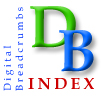
| Search |
 |
||||||||
| Words | Images | Audio | Scholar | ||||||||
|
||||||||
|
Several participants indicated that they routinely use the library system to check for the availability of specific sources rather than to generate a list of potential sources. Derek, Janine, and Mark all commented that they use the library search system and article databases to check whether they can get a source through the library rather than getting a list of possible sources to use for research. Regarding this practice Derek said, "I can't really remember the last time I just went willy-nilly through the [library] catalog looking for something. It's mostly been like I need this book and I know that I need it." Mark offered a potential reason for this approach. He explained that when using the library database "it can be difficult to find what you want unless you know what you're looking for specifically." He elaborates in the clip below. (For a complete transcript of the interview with Mark, see the Words link or download the pdf transcript here.)
For these researchers the library serves as a retrieval service, whereas Google and Amazon are tools for invention. When recognized as such, these search engines can be understood as useful parts of research and composing processes. Clearly, they influence not only the specific search terms that our participants ultimately use when interacting with the library portal, but also their sense of the limitations and affordances of the portal as a tool with which to gather information. Further, the fact that Adrian and Katie rarely (or never) use these search engines in conjunction with the library interface is also an important issue for both teachers and resource managers. Our interviews with these individuals reveal that they are often very satisfied with their ability to find useful information, which in turn indicates that they have developed successful strategies using these tools. But they both expressed a lack of confidence in their ability to translate these effective skills to searches using library resources. What is not clear from our preliminary research is how libraries might address their role as a secondary search resource or how they might address the disconnect between the skill sets that users develop for outside resources and those needed for interactions with library resources. What is clear, however, is that libraries would benefit from seeing themselves as one among many potential, collaborative resources, rather than as the one--or even the preferred--option. The next page explores what this might mean for our understanding of libraries. |